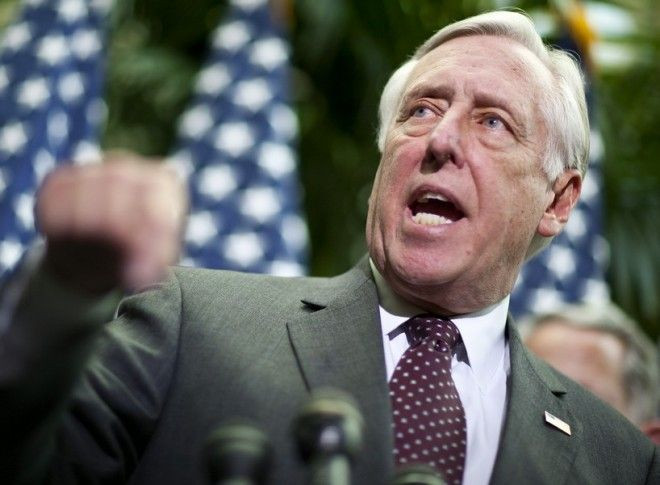Compromise plan has Democrats steaming

The situation in the U.S. capital this weekend is fluid.
With the end of the year, and of the 111th Congress, fast approaching, several major legislative proposals are still to be decided upon, while the Democratic Party, shellacked in last month's mid-term elections, is showing its frustration and fragmentation, and Republicans are trying not to appear too gleeful at their opponents' disarray.
Senate Majority Leader Harry Reid, D-NV, introduced the Tax Relief, Unemployment Insurance Reauthorization and Job Creation Act of 2010 in the Senate Thursday night and asked his Democratic colleagues to hold their noses and vote for it.
This bill is not perfect, but it provides the economic boost middle-class families and small businesses in Nevada and across America need, Reid said.
The legislation, for the most part, mirrors the deal President Obama struck earlier this week with Republican leadership for extending the Bush-era tax cuts for all citizens and unemployment insurance for millions of out-of-work Americans.
The $900 billion bill extends the era tax cuts for all income brackets for two years and sets the estate tax at 35 percent with a $5 million exemption.
The Democrats had originally planned to extend the tax breaks only for people making under $250,000 a year. But Senate Republicans threatened to use their filibuster power to block all legislation Democrats may attempt in this lame duck session, unless the tax break was extended for America's wealthiest citizens as well.
The bill provides a 13-month extension of unemployment insurance benefits wanted by Democrats, and an extension of the ethanol tax credit, which is supported by both sides.
The measure also includes extensions of the American Opportunity Tax Credit for college tuition, the Child Tax Credit and the Earned Income Tax Credit, and a $120 billion payroll tax reduction for workers.
Reid used a procedural rule in introducing the bill that prohibits any amendments and set the time for a vote on the motion for 3 p.m. Monday. The bill appears to have sufficient support from both sides of the aisle to pass. If it does, the Senate can move to other important matters, like an omnibus budget bill to keep the government running and cover the dozen spending bills Congress has failed to pass this year, as well as the START Treaty for arms reduction, the DREAM Act proposal to help the children of immigrants on the road to residency, the Zadroga bill to compensate Ground Zero workers and other legislation.
But not all Senators are happy with the proposal.
''If we pass this agreement as written, it says that we are going to continue the Bush policy of trickle-down economics for at least two more years, said Sen. Bernie Sanders of Vermont, an Independent who caucuses with the Democrats. And to my mind, that is absurd because this is a policy, based on all of the evidence, that grotesquely failed.
Sanders called the deal between Obama and the Republicans a bad deal and I think we can do a lot better.
Sen. Charles Schumer, D-NY and Sen. Sherrod Brown, D-OH, are among those senators less than pleased with the compromise and the legislation. But, with Republicans onboard, the bill should have enough support to pass the Senate.
The House is a different story.
On Thursday,as chants of Just Say No! echoed in the chamber, Democratic Representatives voted against taking up the House version of the compromise measure, at least in its current form.
Earlier, 54 Congress Members signed a letter to House Speaker Nancy Pelosi, D-CA, expressing their displeasure with the bill.
The letter, written by Rep. Peter Welch, D-VT, called the plan fiscally irresponsible and grossly unfair.
Adding more than $900 billion to our national debt, as this proposal would do, handcuffs our ability to offer a balanced plan to achieve fiscal stability without a punishing effect on our current commitments, including Social Security and Medicare, the letter said.
We support extending tax cuts in full to 98 percent of American taxpayers, as the President initially proposed. He should not back down. Nor should we, the letter said.
House leadership is trying to ease the testiness of members, while emphasizing the need for compromise.
House Majority Leader Steny Hoyer, D-MD, said Democrats really have no choice but to accept the deal Obama struck with Republicans, noting that taxes will go up on all Americans in January and unemployment insurance will disappear for millions if House Democrats do not fall in line.
We don't want to put the non-wealthy in our country at such risk, Hoyer said.
We will continue discussions with the President and our Democratic and Republican colleagues in the days ahead to improve the proposal before it comes to the House floor for a vote, Pelosi said.
Rep. Dave Camp, R-MI, who will be chairman of the powerful House Ways & Means Committee in the next Congress, praised the bill.
This agreement does two things the economy needs: prevents a tax increase on all Americans who pay income taxes and provides a foundation for job creation, Camp said.
President Obama predicted that House Democrats will come around and pass the measure.
Nobody - Democrat or Republican - wants to see people's paychecks smaller on January 1 because Congress didn't act, Obama said.
Tim Kaine, chairman of the Democratic Party, said that the two-year extension of the tax cuts will eventually help Democrats politically.
By extending it two years, and I think this is going to happen, you're putting the debate about tax cuts for the wealthiest right in the heart of the presidential election. I think the President feels very confident he can make the case, Kaine said.
© Copyright IBTimes 2024. All rights reserved.





















